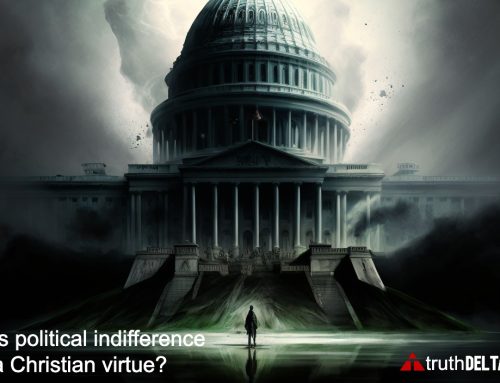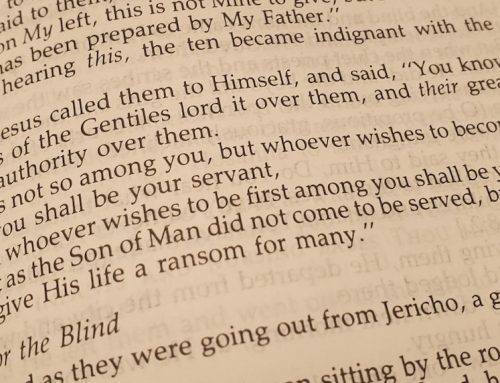The Bible says “happy is he who dashes your little ones against the rocks,” so God must be evil. So says the New Atheist Movement, led by authors Sam Harris, Richard Dawkins, Daniel Dennett, and Christopher Hitchens. These Four Horsemen, and others with them, have made significant inroads against Christianity in the pop culture. This is not good from my perspective, but it is reality.
And it’s not surprising. After all, parents have outsourced their parental job to government schools, social media, and Netflix, and eagerly let pop culture icons like Katy and Miley raise their kids. Sects like Stanton teach a distorted view of God as well, and contribute to the problem. I’ve seen so many people escape Stanton and turn to atheism in an attempt to run to the opposite extreme. This blog is about finding a reasonable middle ground that includes theism, but not the unbiblically oppressive god that so many leaving Stanton run from.
Can we just stipulate that pop culture is not where the intellectually rigorous go to sharpen their thinking? And make no mistake, the New Atheist movement, for all its pretense of intellectual rigor, is purely a product of the pop culture. Their coordinated attacks on theism are an overt attempt to advocate for self-seeking, a pursuit that destroys every civilization that’s tried it. And our post-modernist culture provides a petri dish for this hedonism to grow and thrive, seeking to unground human morality from any and all absolutes.
Whatever anyone wants to believe is perfectly OK, they say. Who are we to judge? Unless it is a Judeo-Christian belief, then it’s fine to judge all you want, and even attack the believer. I’m not interested in whining and complaining about that, I accept that. What I’m not willing to accept is the charge that the God who endowed us with the natural rights that made America a great nation, and who created a moral framework for humanity to thrive, also endorses infanticide. That is just propaganda.
Since the beginning of the world, those who accept ethical monotheism have always been the targets of societies that want free license to do whatever feels good—whatever advances their well-being, however they choose to define it. For pagan tribes, like the Aztecs and even modern isolated people groups, it may be human sacrifice. For the Canaanite cult of Molech (and Planned Parenthood?) it is child sacrifice.
But did the God of Israel take pleasure in the murder of children? This is currently one of the most popular slams against the Bible, probably because the phrase “happy is he who dashes your littles against the rocks” is a head turner when wrested from its context. It’s an easy argument to make when people like Dawkins have such a biblically illiterate audience to sell books to.
I think the charge comes up more frequently now that pro-life advocates seem to be making political and legislative headway in the fight to defend the innocent. They use the classic “yeah, but” defense. Killing babies is evil. “Yeah, but your God endorses it.” No, not quite.
Let’s look at those passages and bring a dose of reality to the conversation. Here’s the entire 137th psalm with the offending phrase at the end:
Psalm 137
1 By the rivers of Babylon we sat and wept
when we remembered Zion.
2 There on the poplars
we hung our harps,
3 for there our captors asked us for songs,
our tormentors demanded songs of joy;
they said, “Sing us one of the songs of Zion!”4 How can we sing the songs of the Lord
while in a foreign land?
5 If I forget you, Jerusalem,
may my right hand forget its skill.
6 May my tongue cling to the roof of my mouth
if I do not remember you,
if I do not consider Jerusalem
my highest joy.7 Remember, Lord, what the Edomites did
on the day Jerusalem fell.
“Tear it down,” they cried,
“tear it down to its foundations!”
8 Daughter Babylon, doomed to destruction,
happy is the one who repays you
according to what you have done to us.
9 Happy is the one who seizes your infants
and dashes them against the rocks.
The implication by the New Atheists in quoting this verse is obviously that the God of the Bible was happy about babies being “dashed against the rocks.” Nonsense.
First, let’s dive into the context of the psalm (song) itself. It was most likely penned by Jeremiah. In fact, it is included with the Lamentations of Jeremiah in the Septuagint. That is the Greek translation of the Old Testament that Paul and other New Testament writers would have grown up reading and hearing in the synagogues. As for the historical context, it was written during the Babylonian captivity, after the Kingdom of Judah was sacked by Nebuchadnezzar for doing evil. Babylon was located in modern-day Iraq.
A standard pagan act of domination when taking a city was to kill the infants in front of their mothers, and this is what Babylon did to Judah. Parents watched their babies get murdered by the conquering army. Edom makes a cameo appearance in the passage because they were the kingdom on the southern end of Judah that had a grudge against their neighbors to the north, and incited the Babylonian army to tear Jerusalem to the ground.
But at the end of the Jews’ 70 year captivity, God allowed the Medo-Persian Empire (roughly equivalent to modern-day Iran) to sack Babylon, ending its domination of the region. Cyrus the king of Persia was so determined to conquer smug Babylon, that he is said to have spent two seasons digging manmade tributaries for the deep river protecting Babylon so that his armies could cross on their horses. He was a patient conqueror. He then defeated the Babylonian army outside the walls, only to have them retreat inside the gates.
Since he couldn’t penetrate the city walls, and Babylon had prepared vast stores of food to endure a siege, he dammed the river flowing under the city gates. This provided a passageway for his army in the middle of the night. The book of Daniel describes this last night of Babylonian rule as the once-great empire fell to Persia.
The Jews were gradually given the right of return to their homeland under Cyrus’ rule, and their rebuilding of Jerusalem and its walls would become the topic of Ezra and Nehemiah. Those who didn’t return to Jerusalem from the Babylonian exile became the ancestors of the modern-day Iraqi Jews.
If we are to understand Psalm 137, it’s important to recognize that the legal framework of the Old Law described justice as an eye for an eye (one-for-one retribution). In a primitive civilization, this was a marked improvement over the surrounding pagan cultures, which most often had a standard of sevenfold retribution, or worse, death. This psalm, then, was a very human emotional cry for justice from parents who had seen their own babies murdered by the occupying Babylonian army.
Even the most godly of parents whose children have been slaughtered in front of them would understandably have a hard time not wanting some sort of retribution for the murderers. God never prohibits mankind from feeling the emotions of the human experience, and even challenging Him about those experiences. He does want moral restraint; and the Bible describes many overreaches of that. That’s what makes the Bible such a powerful document, because it describes the raw human experience, along with the teaching and training of a loving God trying to improve it.
Notice also that it’s not the author, or even the wronged Jewish parents, who wanted to inflict retribution on Babylonian babies. Jeremiah is simply predicting what will happen. It was a prophetic prediction that some future army (the Medes and Persians) would take joy in slaughtering Babylonian babies, which they did.
Psalm 137 is therefore a mournful piece of poetry based on a real-life historical atrocity. The psalm remembers longingly the Jews’ homeland and independence, but never has God taking joy in the suffering of innocent babies. Nor does Jeremiah, the author, express joy in the slaughter of babies. Instead, it is merely a prediction of a future doom that Babylon would experience.
It is a gross misreading of the text to charge the God of Israel with taking delight in cruelty to children. God is fundamentally a loving and just God, and spent thousands of years educating a rebellious creation with free will about how to maximize human happiness by living society with moral restraint and justice.
God has always had to relate to mankind where he was, not necessarily where he wanted them to be; kind of like what we have to do with our kids. This fits perfectly with the New Testament theme that the Old Law was a “schoolmaster” to bring us to a better understanding of love, law, justice, and grace.
To charge the God of the Bible with atrocities like this one (and others put forward by New Atheist authors) is the result of either intentional deception or biblical and historical illiteracy—and most likely a bit of both. I lay the bulk of the fault at the feet of parents who haven’t taught their kids a sound biblical understanding of the God of love the Bible reveals.
Kids who have grown up believing everything that is recorded in the Bible was endorsed by God have been set up for future unbelief whey they see that bad things by both good and bad people are recorded in it. But the disingenuous New Atheists have an easy time preying on those who really have no interest in thinking through these things for themselves. Most people just want to be free to “enjoy their life,” as Christopher Hitchens’ bus tour promoted. What they don’t understand is that they are sowing the wind, and will reap the whirlwind.
If you were raised with this view of scripture (or you came to understand it that way, whether intentionally or not), I encourage you to consider that you’ve been misjudging the God of the Bible based on teachings of men. It’s not hard to reclaim the doctrine of Christ (i.e., the preeminence of love) on which Jesus says the entire law and the prophets hang. Isn’t that good news?
In the meantime, we should inoculate our kids against the anti-God propaganda in our pop culture by teaching them the truth—that the Bible is a faithfully recorded history of mankind’s best and worst moments. It was never intended to be a code book to be cited like a municipal building ordinance. It contains the good, the bad, and the ugly parts of human history. But what ties it all together into a coherent volume is its unfolding revelation of morality, and the “golden thread.” That golden thread is the Good News of Jesus Christ that runs through it from Genesis through Revelation.







Hello All! I have a question that has stayed with me since I chose to leave Merie’s group. Before I left, I was rebuked-several times-for leaving fellowships with my husband when he wanted to leave. Background Info: At the time, my husband and I were usually some of the first to arrive at fellowships, usually around 6:30ish. At about 11:30, 11:45, my husband would let me know that he wanted to leave. I would usually ask him to please give me a few minutes as I wanted to do dishes and clean up the kitchen of who ever home it… Read more »
I think this is more evidence of Stanton’s desire to put women into positions of power over men. Hence the lack of elders. You ladies are much more social—by God’s design—than us men (generally speaking, of course there are exceptions). I think Merie’s rise to power created a pattern of success for women who followed her…project yourself into a position of being “the more spiritual one” (at least according to the perception of your peers) and you can demagogue your husbands and other males into submission. This is contrary to God’s will for marriage and the church. This dynamic has… Read more »
Agreed Kevin! I know that they constantly were commenting that my husband and I spent too much time together. I had one teacher tell me that I “made some of them (wives) look bad”-not because I was such a great wife! (Please, don’t anyone think that I am tooting my own horn here!) But because I actually loved-and still love-my husband. I wanted to spend time with him, and our daughter. There were times we went out on a Friday instead of going to a fellowship, and things would be said to me privately about that, but no public rebuke.… Read more »
Yes, I think it’s all a part of the cult of personality Merie created. She rose to prominence in the heyday of militant feminism and Marxism. She was a syncretist, really—piecing together what she liked from the Bible with what she liked form worldly philosophies. But she was a master of making it all sound legit as if it were from the Bible.
Debby, I know I’d usually be the one to tell my wife it was time to go. She likewise would clean up before we left. To my knowledge she was never reproved or rebuked for leaving, nor told to catch a ride with someone else. We also would miss an occasional Friday night fellowship to go out for dinner or have dinner at my parents. Maybe your teachers were more oppressive in that area than others. Total nonsense being rebuked for something that was far from a sin. I’m blanking on BM husbands name. But if it were those two… Read more »
Debbie, you really got a raw deal! I sure hope VM and BM have learned a thing or two from TC and PC. VM is preaching and attended the March meeting this year.
I didn’t know they were sat down! For 7 years our address and phone numbers were the same, and we only received one confession and that one was a week after I left the group. To me, that means that what they did to us is ok with Merie’s group.
Just a quick question Craig, what do you mean that the leadership didn’t get along or work well with one another? When I was there it was only the two of them in charge! Thank you!
Debby, based on what you said here about the preacher and wife, it sounds like underlying jealousy at your close relationship. We humans can go through so many stages in marriage and life, and they were clearly going through a bad one and may even be yet. But as we know from Merie’s group, the problem is that these same people can call you out, based on their own judgement of what they think you should be doing. Anyone in their right mind can see you went above and beyond to participate in the fellowships. The problem was not you,… Read more »
Great points M. Long! After I left, I finally had the time to think on all of the does and don’ts of the group. I realized how much I had let them control my life, and dictate what is right and what is wrong. My husband and I are even closer now, because we are free to talk with each other, and to listen! Once he left the group too, we actually spent a couple of weeks talking and listening to each other. for hours at a time! The freedom to love and confide in ones that you love and… Read more »
You nailed it, MLong. When I was able to broach the topic of all of my mom’s asking of permission to do things, I think it resonated with her. But eventually, the stalwarts got to her and “counseled” her not to talk to me about anything related to the Bible or church. Because, you know, truth should always run away from lies, right?
BTW, thank you for all your help improving the color scheme! 🙂
“the problem is that these same people can call you out, based on their own judgement of what they think you should be doing.” This is so true. Tacoma likes to do this and they will actually have that statement in their answers and judgments that they think you should be doing more and/or comparing you to another member. They have made scripture prerequisites where there are none. I.e., if the scriptures tell us to bear one another’s burden’s, or anything from Matt 25, they will give you prerequisites to fulfill before they choose to obey the scripture(s). This biggest… Read more »
I agree M.Long! I am trying to analyze exactly how the turning over of one’s personal thinking to the control of another human being happens. The church won’t say we have to ask for permission to do things; they will say we seek counsel. Counsel equals permission no matter how you slice it. Counsel says no, don’t do it; don’t go against counsel; in other words, permission not granted.
Why did they want you to stay? Just curious!
You might notice that I posted a new poll today. I am most interested in honest responses, not biased responses intended only to make a point. So I’d love to get an honest picture of Stanton’s effect on your view of God. I realize that we could all give more nuanced responses than a one-line multiple choice poll. But do your best, I think the results will be interesting. FYI, I answered my own poll that Stanton had “no” effect on my view of God, because I was blessed to have other influences that compensated for Stanton’s extreme legalism with… Read more »
I responded they drew me closer to God. I knew far more about the Bible after my stint in Stanton, and despite my uncongenial separation, knowledge of God is from the Bible. It is impossible to love what one does not know, and if one does not know the Bible, one does not love God. Worse, they don’t know God loves them. Humans must first have, to be able to give. Only those who know God’s love for them, can truly love others. As for being able to love ourselves, humans do that quite naturally. Witness a little baby. They… Read more »
Monte, I’m not arguing with your experience. Others had very different, much more destructive experiences, either as kids, or as adult converts. I too came out of Stanton with a strong appreciation of the Bible. But it was precisely that appreciation that led me away from Stanton when I realized they were not teaching the Bible accurately on many, many subjects. I will also say that it is possible for the Bible itself to become an idol, just as it’s possible for a particular church or church leader to become an idol, and even for Biblical teachings like baptism, church… Read more »
Thank you, I’m guilty of idolizing God’s word. A very flattering compliment, and I’m much obliged. There was another man who idolized God’s word. You may have heard of him. His name was David, and he was known as a man after God’s own heart.
Stanton attacks sin way more than this website, and since sin is the greatest enemy any of us faces, that doesn’t portend well for their critics.
Monte, Merie’s cult attack’s sin but they do not recognize their own sin. Agree? Where I attend they “attack” sin as well. So the claim we probably all heard from Merie’s cult that outside of their walls the “religious world” turned a blind eye to sin is simply another lie we were taught.
Monte, I knew I could count on your reply to this one. Lol First, I said nothing about idolizing God’s word. I know how we colloquially use that term, but remember that the Bible includes direct quotes from bad people—those things are not “God’s word” per se. Again, I know what you mean by that phrase, and I’m not being nitpicky, it’s just important to understand fine distinctions in our language. (In other words, the Bible can be an idol, but the message of the Bible can never be, if that makes sense.) In that way, it’s possible to idolize… Read more »
“This new age nonsense about being able to love ourselves, and self-esteem, and self-confidence simply excuses pride, arrogance, and conceit.” I must say that I have seen an unbelievable amount of pride, arrogance, and conceit in my years in Stanton, as well as in those who still heartily believe in their added teachings. It takes a lot of pride and conceit to ADD to the Bible, to think the lack of growth is not due to your own fruits, and to even think that no one outside your little sect of about a thousand is going to heaven. It takes… Read more »
Craig, certainly Stanton is quite blind to their own sins. I walk in to class last night, and they immediately begin teaching about pride. Well, it’s not pride to say, ‘Sin, when repented of, can be rapidly and completely healed by God’. There are at least 25-50 instances of this happening in the New Testament, and Christ said his Word had the power to do above what he did when alive. Stanton doesn’t believe in this. The power of hope is something they reject, and they reject those of us who proclaim there is more to Christianity than their fixation… Read more »
I’m really struggling to find peace in Christianity since leaving the SCOC. I don’t know what church to go to now. I judge all the ones I have gone to as not Godly enough. Anyway, I’m never going back to the cult because they are a bunch of freaks obsessed with masturbation. Even accusing my kids as young as 4 of it. Just sick. That was when I decided I’m never stepping foot in the building again. How was I so blind? And yes I know for a FACT that the preacher of my congregation comes on here to spy… Read more »
Stepping out and never going back is the first step to healing. Judging everyone and every group I come across was something I did consciously and subconsciously for probably a decade until I learned better in Christ. Give it time and feel free to reach out and call or email me. God bless!
Thank you Kevin for the kind reply. I guess I just need to let myself heal from years of oppression and judgement. It’s very hard when you still have family in it telling you to come back and praying for my soul. I’ve told them about the blog and they refuse to even look at it.
I just don’t know where to go. A friend invited me to their Pentecostal church and that was a big NO from me. Lol.
Dear Never going back! I don’t know how long it has been since you left the group but, as Kevin shared, it takes a long time to get past the group and it’s effects on you. I can’t presume to know you, but I would like to share some of my experience with you-if that is ok? Please feel free to disregard my post here, I understand if you don’t agree with it! It’s been 13 years for me, since I left the group. At first I was very bitter against the group and the teachers, but I knew I… Read more »
Excellent advice, Debby. Very perceptive.
Wow Debby! Thank you for such a thoughtful message. I think we have a lot in common and I thank you for the advice. I’ve started the clean bible challenge and I’m going to take a step back from finding a church for awhile. I’m only about a year out so I still am angry about all the time I wasted there. Plus, I still have family in the SCOC that won’t even listen to me about all the false teachings. They just shut down and I don’t know how to get through to them. So frustrating! They don’t think… Read more »
NGB, Debby definitely has some good advice. I wasn’t raised in the church (was actually raised Pentecostal), so in that way I already had an experience in leaving something I was attached to. When I left Merie’s church two years ago, I was determined to immediately find somewhere else to attend. I had been withdrawn and fallen away years before this, and at that time I went right into blatant sin and discouragement. This time around, as I plotted my way out, I remember thinking that I was not going to become another poster child for them to hold up… Read more »
Thank you MLong for the encouragement! You are very kind and your kids are lucky to have you!
I’ve never felt this kind of love and encouragement while in the SCOC and it helps me realize there are true Christians out there not apart of the group. Thank you everyone!
I’m not giving up on God like they believe I’m lost now. I’m so glad I found this blog. It helped open my eyes to what I was a part of for TOO long.
Never going back – Comments like this are so encouraging. Thank you for taking the time to engage in the conversation here. I’m glad you found us.
God bless!
NGB, also I too have been ashamed for not standing up and saying something when they were unkind to others especially publicly. But sometimes I did say something. You can’t feel guilty about that and we can’t go back and change it. At some point you will heal enough to help others. Even now, just posting as you are, you may be helping someone or your words may be resonating with someone still in and trying to leave or heal too. That’s what this site is about. Healing and helping. Good for you for standing up for your kid. Don’t… Read more »
I am so happy you are out of there. Part of my family still involved but I pray they will see the light. If we do not stick up for our families when we see something is not quite right who will? Just remember “one day at a time”. Blessings from a mother and grandmother who belongs and always has to another church.
Thank you JOC! I’ll pray for your family too!
Thoughtful and kind advice.